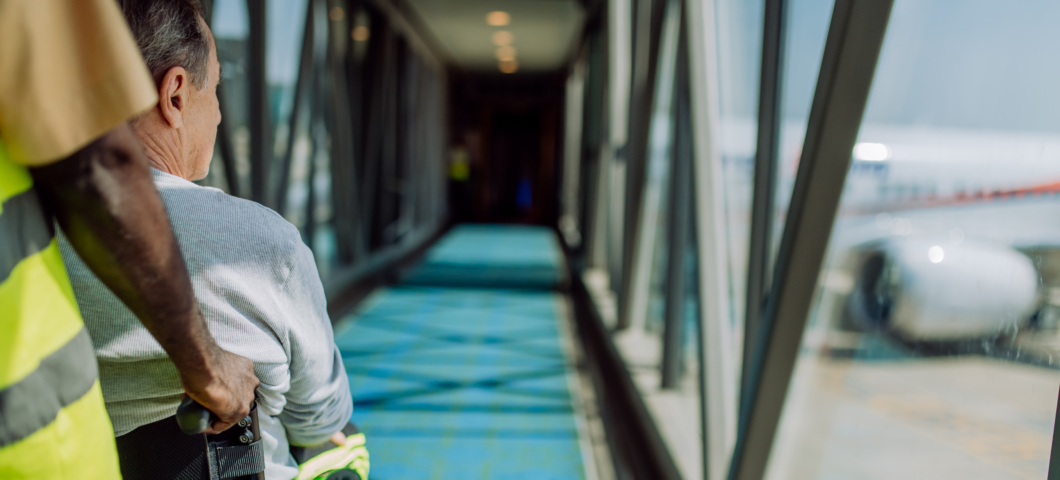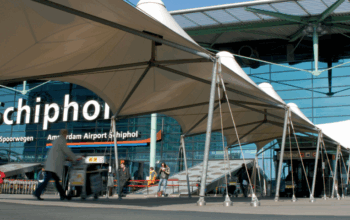
New survey results shed light on airports’ readiness to welcome passengers with reduced mobility
With Eurostat estimating that 1 in 4 adults in the EU is living with some form of disability, passengers with reduced mobility (PRM) are making up an increasing number of overall travellers. From check-in to security screening, boarding, and baggage collection, every stage of the journey requires thoughtful accommodations to ensure accessibility, dignity, and efficiency. ACI EUROPE has a long track record of setting out best practices in passenger facilitation and accessibility, enabling European airports to meet – and most often exceed – the legal requirements in the EU. The need for these accommodations is mandated by EU law – Regulation EC 1107/2006 concerning the rights of disabled persons and persons with reduced mobility (PRM) when travelling by air, which aims to ensure that PRM have the same opportunities for air travel as people who do not have a disability of any kind. But the implementation of such accommodations varies significantly across airports.
With this in mind, the ACI EUROPE Facilitation & Customer Services Committee created the 2024 Survey on the assistance to Persons With Reduced Mobility and Persons with Disabilities. 78 airports across Europe responded, representing 43.82% of passenger traffic. This survey asks airports for a comprehensive breakdown of their PRM facilities – from how and when assistance is registered, the average charge levied, and how that assistance is given.
Chair of the ACI EUROPE Facilitation & Customer Services Committee, Benedetto Viola, noted the importance of such surveys for airports and passengers alike. ‘Ensuring an inclusive and seamless travel experience for all passengers is a fundamental commitment for airports. The 2024 PRM Survey offers a clear picture of how assistance is delivered to the most vulnerable passengers across European airports and provides useful insights that help us reflect, learn, and keep improving.
From increased staff and training efforts to enhanced accessibility and service quality, the results highlight the commitment to meeting the evolving needs of passengers requiring assistance. By listening to their voices and acting on their feedback, airports affirm their role as inclusive spaces of connection, where everyone is welcomed and supported, and no one is left behind.’
Discover the key findings below.
A growing demand for PRM services – and airports are responding
Airports of all sizes across Europe are seeing a steady increase in PRM passengers, with the survey revealing that they now account for 1% of total air travellers, up from 0.82% in 2019. Large airports saw the biggest rise, reaching 1.44% of total passengers. 78% of airports responded that requests for PRM assistance also heavily fluctuate with the season, with the peak summer travel season (May – September) featuring the vast majority of requests. 78% of airports also experience a specific peak in PRM traffic during the day.
As a result, airports are expanding their capacity to provide PRM assistance: the general increase in staff engaged directly in PRM assistance services from 2019 to 2023 is 33.47%. 75% of airports have dedicated staff for PRM assistance, and 68% outsource PRM services. Another key development is the widespread adoption of PRM-specific management software, with 75% of airports now using digital tools to coordinate assistance efficiently.
Coordinating the process: how and when?
61.7% of departing PRM passengers now pre-notify airports of their need for assistance, with 62.3% of arriving passengers also providing such notification. For connecting flights, the figure is lower at 35.8%. While pre-notification helps ensure faster, smoother service, airports are also equipped to assist passengers who request support upon arrival. Designated PRM call points are now available in 98% of airports, allowing passengers to request assistance on the spot.
Speaking on the importance of pre-notification to ensure these services are in place for all PRM who require them, Marina Maschio, Managing Director of ADR Assistance, notes ‘Pre-notification is essential to ensure that all passengers who need assistance receive it. When passengers pre-notify, airports allocate resources in a structured way, reducing waiting times and improving the overall travel experience.
Advance notification allows for a more personalised service, tailored to the needs of the individual and their disability, ensuring greater accessibility of airport services. As passenger traffic increases, our commitment is to ensure accessibility and efficiency for all travellers, reinforcing inclusiveness as a core value of airport services. ADR will continue to invest in technology and innovative solutions to further improve the quality of assistance.’
The responsibility for delivering PRM assistance varies across airports, reflecting differences in size, operational models, and regulatory frameworks. 49% of airports fully outsource PRM services to third-party providers, using external staff and equipment, 26% manage services in-house, employing airport staff and maintaining their own PRM equipment, 11% use a hybrid model, where external staff operate airport-owned equipment, and 8% rely on a subsidiary of the airport authority to manage PRM services directly.
The survey also highlights the availability of certain services – with 73% of airports now providing dedicated PRM lounges or waiting areas, 98% of airports offering wheelchair-accessible bathrooms, and 93% ensuring accessibility for passengers with walking difficulties. 75% of airports have wheelchair-accessible check-in counters. Airports now stock an average of 996 wheelchairs (of varying kinds) per million PRM passengers. Additionally, ambulifts (34 per million PRM passengers) and electric buggies (32 per million PRM passengers) help ensure seamless transfers across terminals.
These expanded services and infrastructure investments are reflected in the average PRM charge per departing passenger, which has increased slightly since 2019: large airports charge an average of €1.21 per passenger, up from €0.87 in 2019, whilst smaller airports have the lowest charges at €0.34 per passenger.
Building an inclusive culture
The survey highlights how airports are going beyond legal compliance to foster a truly inclusive culture. One of the strongest indicators of this commitment is training and awareness programs: 97% of airports provide formal training for PRM assistance staff in line with European standards. Additionally, 62% of airports extend disability awareness training to all staff, from security to check-in personnel, reinforcing an informed service across all passenger touchpoints.
40% of airports collaborate with disability organisations in their awareness training, while 38% involve these groups in PRM assistance staff training. Beyond staff education, 43% of airports recognise the Sunflower Lanyard scheme, supporting travellers with non-visible disabilities, with 46% of airports providing alternative routes for these passengers. Supportive services are in place for those with Autism Spectrum Disorder (44% of airports), hearing impairments (43%), vision impairments (42%), dementia or Alzheimer’s (34%) and diabetes (21%).
Additionally, 76% provide accessible complaint channels, allowing PRM passengers to voice concerns and drive improvements. 95% of airports have set PRM service quality standards, and 91% publish them online for transparency. 88% follow the ECAC DOC 30, 5-C Annex guidelines (unified guidelines across European Civil Aviation Conference (ECAC) member states to standardise assistance for PRMs) whilst 79% conduct PRM satisfaction surveys, directly incorporating feedback into service improvements.
Maria Kapralou, Head of Services to Passengers with Disability at Athens International Airport, stressed how airports are prioritising PRM services. ‘ACI EUROPE’s initiative to create a dedicated Accessibility & PRM Services Task Force reflects the significance of ensuring a seamless travel experience for all passengers. Based on the PRM 2024 Survey results, investing in specialised training for assistance services personnel and extending disability awareness training to staff involved in other airport services is a priority for most airports.
Coupled with physical and digital accessibility measures, personnel training ensures an enhanced and personalised customer experience for passengers, promotes equal treatment and fosters a more inclusive, unobstructed and accessible air travel culture.’



